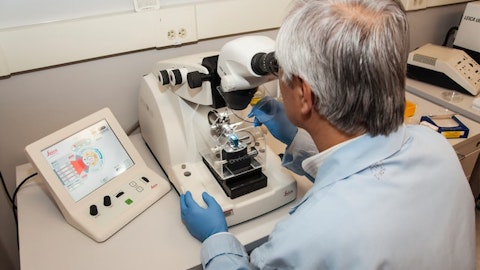Ren Benjamin: Got it. And then just switching gears, because I know we’ve talked in the past about the neoadjuvant study, the importance of the neoadjuvant study. I might have missed it in the prepared remarks, but can you talk a little bit about where we are, when we might expect to see any data? And how that program might ultimately move forward?
Dan Passeri: Yeah. Matteoo, I think that’s also you.
Matteo Levisetti: Yes, certainly. So the neoadjuvant trial at Washington University is going very, very well, okay? And the trial is currently enrolling patients in the second schedule, which is patients are getting two doses of CUE-101 before treatment with curative intent, either surgery or chemo-RT. So important to note that this is an investigator-sponsored trial and so the timing of sharing and presenting this data will occur as a collaboration with the group there that hold the IND for the IST. We have seen some early data that looks very encouraging. And so we really feel that this will further our understanding of CUE-101’s effect in the tumor microenvironment, since the analysis and characterization of tissue-based TME blood-based immune markers and even T cell receptor presence in the tumor pre and post-treatment really is going to be really an exciting data set to look at when it is presented with our collaborators.
Ren Benjamin: Got it. And then I guess, just finally, as we think about CUE-101 — sorry, CUE-201, I think, going after CUE-101. Can you — you mentioned on the call, clinical activity that you’ve seen — can you maybe provide some additional color on those responses in the tumors where you saw an impact? And maybe related to that, as you think about that program moving forward, how should we be thinking about the ideal combinations and the potential to sequence with subsequent checkpoints?
Dan Passeri: Certainly. So thanks for the question. So to begin, the next steps are really to determine the recommended Phase 2 dose, okay? So that is the primary objective of the dose escalation component. With regards to the activity that we’re observing, okay, we have four cancer types here. And as we’ve stated, we’ve seen now a reduction that’s been sustained for over 18 weeks in a patient with advanced metastatic gastric cancer. We have several patients now that have stable disease confirmed up to 18 weeks, so across different indications. So we look forward to presenting the formal analysis of what we’ve seen with regards to effects on tumors at the CT meeting. With regards to where we’ll be going, I think once we establish the monotherapy activity okay, these various indications that will certainly assess rational combinations to consider taking forward.
And really importantly, I think understanding that unique biologies of different tumor types, okay, may really direct based on the data where it would make sense to combine Q1 02. So we look forward to seeing that just as an example, in colorectal cancer, it’s — I think, believe they’re pretty much accepted that part of the resistance to checkpoint inhibitors in immunotherapy is born out of a dominant immunosuppressive environment. And so in that tumor type, it would make sense to consider combining with something that that interferes with that immunosuppressive pathway, it could be a TKI, it could be another agent. So that’s where we’ll be heading. And for example, in gastric cancer, I think there’s been some activity with checkpoint inhibitors.
There’s an approval in the HER2-positive subset of gastric cancer for pembro plus HER2 targeting agent that may be a cancer indication where it would make sense to combine with an anti-PD-1 or other checkpoint inhibitor, and that’s what I think we’ll be considering.
Ren Benjamin: Perfect. Thanks very much for taking the questions. Good luck.
Dan Passeri: Thanks, Ren.
Operator: Thank you. Your next question comes from Stephen Willey with Stifel. Please go ahead.
Unidentified Analyst: Hi, guys. This is Toni [ph] on for Steve. Can you guys hear me okay?
Dan Passeri : We can hear you just fine. Thank you.





